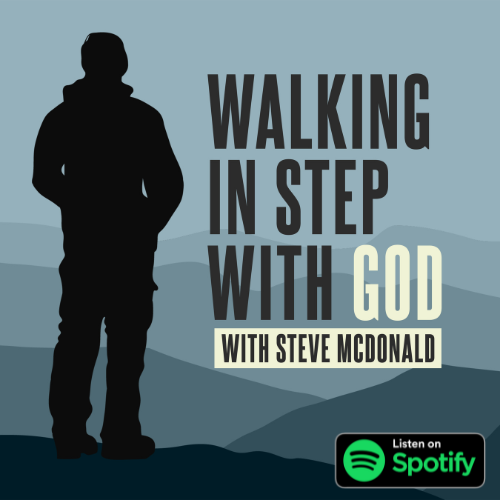Prefer a podcast? Click here to listen to the podcast version of this message.
Transcript:
Hello, welcome to Walking in Step with God. I am Steve McDonald. Today we explore the topic “How Faith Guides Your Spending” as the next installment in our series “Faith in the Grind”. In this series we are exploring the intersection between our faith and all the areas of our lives that keep us on the go from work to school to a busy home life. We are learning how to stay plugged in to our faith regardless of the buzz and business that surrounds us.
Today, I’d like to explore the area of our finances and some things to be mindful of as we set out to earn a living. We work hard and we are compensated for our work, but what should we keep in mind as we set out to -spend- our income?
Before we get started, if you are watching on YouTube, I would immensely appreciate it if you could click that like button and subscribe. I also invite you to share your comments throughout this program. Your engagement truly helps us share God’s word with more viewers. If you are listening to our podcast, please be sure to follow us and leave a rating for this episode. Your positive feedback helps us reach more hearts seeking spiritual nourishment.
If the message you hear today resonates with your heart, and you feel led to partner with us in this ministry, we invite you to prayerfully consider becoming a financial supporter. Your generous contributions empower us to create more resources that share God’s love and bring hope to many.
Here is how you can help. I’ll be right back.
Welcome back. Let’s continue in our discussion ways our faith can guide our spending habits.
Be Generous
The first consideration I’d like to remind you of is the opportunity to be generous. Our faith guides us to be compassionate, loving, and compassionate to the world around us and there are an abundance of opportunities to help others in need.
There is a global epidemic of homelessness in nearly all our cities. There are those who are not homeless, but are living without the basics to get by day to day. There are nonprofits that are pursuing important causes such as health care, education, animal welfare, human rights and community development. You may attend a place of worship that accepts contributions and offerings from its community.
God is pleased when we give, so let us seek out ways that we can give generously. I believe it is less about the amount of funds we give and more important to consider the opportunities that our generosity can have an impact on. For example, you may provide a bag of groceries to someone who is homeless and give them food to eat for a week, even as the same amount of money could be spent on a single meal at your favorite restaurant.
Ask God today to lead you to opportunities to be generous and give.
Embrace Contentment
The next item I would like to touch on is the idea of embracing contentment. All of us have things that we want and things that we need. In a world that focuses on materialism and the chase for more things, I believe there is an opportunity to practice contentment. Practicing contentment also helps us to focus more on God’s provision.
By this, I mean giving deliberate thought on the motives behind our spending. Are we purchasing for need, for convenience, or for vanity? Are we purchasing a pair of shoes or purse or coat because of the brand name and the ability to be seen with that brand or are we purchasing something because of its ability to provide utility and increase our quality of life in some way?
There is nothing wrong with purchasing nice things, but I do think we should be cautious to make purchasing decisions while being mindful of our motives. You may have heard of the saying, “Just because you can doesn’t mean that you should.” That saying applies to our spending as well. Just because you can buy a different pair of shoes for every day of the week, does it mean you should? What are your real motives for having such a wide variety? Could you be content with 3 pairs of shoes to mix and match instead of 7? There is not a right or wrong answer, but the path to contentment does include a recalibration of need vs want and leaning on the side of finding contentment with what you need and some of what you want instead of pursuing every thing you can have.
God knows your wants and your needs. You have free will to do whatever you wish, but I invite you to ask Him to help you to find contentment while also being responsible in your spending.
Be a Good Steward
God created all. He created you and me. I believe it is fair to say that so many things we pursue in our spending are derived in some shape or form by God. Our new car, our new home. We have acquired these things by working hard and earning enough income to purchase them. Our ability to use our God-given gifts based on our God-given plans suggests to me that the things we buy actually belong to Him. We are simply stewards of the assets we acquire – for a time.
We cannot take it with us when we die, so no matter what we own, we are simply on borrowed time. If we consider this truth, I believe we can demonstrate our faithfulness to God in two important ways. First, we can be thankful for the ability to acquire the things that we own. Be thankful for that new or used car you just purchased. Thank God for the job that provided the income for you to afford that vehicle. The second way we can demonstrate our faithfulness is to take care of our assets. God helped you to be able to afford a car, so make sure it gets proper maintenance and keep it clean. Take care of your things no differently than you would expect someone -else- to take care of it!
Thank God today for all the things in your life, knowing that He helped you to acquire them.
Wrap Up
In today’s message, we discussed the impact of faith on our spending habits. We examined the importance of being generous. There are a multitude of opportunities all around us to be generous. From causes that are important to you to the homeless individual you pass every day on your walk to work, we are called to give to others in need, and God is pleased with every act of our giving. Next, we discussed the idea of embracing contentment. Just because we can afford something does not mean we need to buy it. While it is ok to have nice things, let us be mindful to pursue contentment instead of materialism. Lastly, we delved into the concept of being a good steward. God created all things on the earth, including you and me. While man has created many things, we cannot take a single thing with us when we leave this earth. One could argue that every single thing you have purchased belongs to God. Your house, your car, that shiny new laptop. Let us be good stewards of our things no differently than we would want someone to be a good steward of our things if we lent it to them.
We’ve learned just a few of the ways that our spending can be influenced by our faith. God gives us free will to do as we please and that includes our decisions with our spending. Let us be mindful of the blessing of the funds we have to spend on things that are beyond our basic needs. Let us resist the urge to spend so that others will notice and more on ways that God will notice.
Ask God to give you guidance and understanding about your current spending habits and how you could make changes in a way that will be pleasing to Him and grow your faith.
Are you interested in discovering more about the guidance offered in this message? Learn more in the companion article Going Deeper with the Word: Discover God’s Rest in a Busy Life







